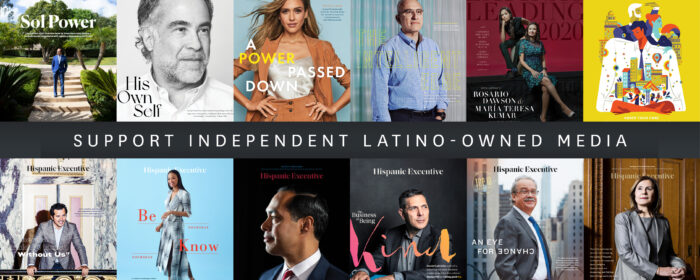|
Getting your Trinity Audio player ready...
|
When companies want to reach Hispanic, Asian, and Black consumers, they turn to ThinkNow, a cross-cultural research firm cofounded by Mario Xavier Carrasco and Roy Eduardo Kokoyachuk. Today, Carrasco uses data, technology, and his own lived experience to demystify multicultural marketing and help clients understand the nuances of diverse communities. Carrasco recently spoke with Hispanic Executive to share what led him to strike out on his own and explain how he got the company off the ground in 2011.
I studied literature in college but went to business school for entrepreneurship and innovation. I landed a job in marketing at a magazine focused on the Hispanic audience (Hispanic Business Magazine), and that changed my career because I was able to embrace my culture as a Mexican American in my work. Spanish is my first language, and I started to realize I could use my cultural heritage in a professional setting. That got me thinking more about multicultural marketing, especially as I started to meet more advertisers and get exposed to data and analytics.
I worked my way up in different organizations and wound up in the research industry, in a job where I was hired to build an online division. I built a panel, which is a group of people that take surveys on a regular basis.
What I didn’t know was that other larger research companies had tried and failed to build Hispanic panels in the past. But within two years, the panel I built became our top revenue generator because I built in language and culture. It was Spanish-first, with Latino artists producing the content. The company I worked for sold to another group, and that was the jumping-off point for ThinkNow.
“A lot has changed, but one thing has stayed consistent—and that’s our unwavering mission to be the voice of the multicultural consumer.”
Mario Xavier Carrasco
At that time, though, I faced a crossroads: would I stay through the acquisition or start my own thing? I knew the demographics of the country would trend towards multiculturalism. I had a colleague who would become my partner and cofounder, and we knew we could help leading companies make culturally relevant marketing campaigns and develop products and services to serve this demographic. We didn’t want to be executives in a company that had a Hispanic division. We wanted to start a company fully dedicated to multicultural consumers. That’s where we got our name—everyone was saying they would reach these consumers in the future, but we were saying you have to think about it now.
The first year was an adventure. Our previous CEO met with us before we had a website or paperwork filed and offered to invest $500,000 if we signed a contract and promised not to start a panel. We said no. We didn’t want investors because we wanted control over our ability to execute on our vision . . . so instead of $500,000, we each threw $500 on a Visa gift card and that was our seed money.
We started consulting and outsourcing almost everything, but before long, we had people calling us for work. Roy, the cofounder, had an accessory dwelling unit behind his house, and we set up there. We sat at six-foot plastic folding tables and took calls with McDonald’s executives. Our mission was serving multicultural consumers through research, and we took any work that would fulfill that mission.
McDonald’s wanted to launch a new shake, and we helped them take it to the Hispanic market. We started attracting other clients and evolving as they let us know what they wanted. It wasn’t “If you build it, they will come.” It was the opposite: it was “Listen to the customer and build what they need.”
“We didn’t want to be executives in a company that had a Hispanic division. We wanted to start a company fully dedicated to multicultural consumers.”
Mario Xavier Carrasco
We originally thought we would be an online community provider—in 2011, everyone was investing in market research online communities. But that was a fad, and ThinkNow evolved into a totally different thing. People were calling us for qualitative and quantitative research, and for access to a panel . . . so that’s what we did. Year one came to a close, and we had partnered with bigger clients than we expected. In year two, we would start our panel—to afford the software, Roy and I both put the pink slips for our cars up for collateral on a loan.
This whole era taught me the value of reputation. People don’t work with companies—people work with people. Not working with jerks became a core tenet of ours. We turned down some work and refused to hire some people because we valued cultural fit so much. Our job is to make whoever hires us look good, and that means taking care of people and delivering quality work.
We were profitable from year one, and we still have a full-service department, as well as our panel. Now, though, we have a government panel, a tech arm, and an SaaS platform. We’re also launching a media division so we can use our powerful data more fully. Today, we have about forty-five employees in three countries, and we’ve been included twice on the Inc. 5000 list of the fastest-growing private companies. A lot has changed, but one thing has stayed consistent—and that’s our unwavering mission to be the voice of the multicultural consumer.




